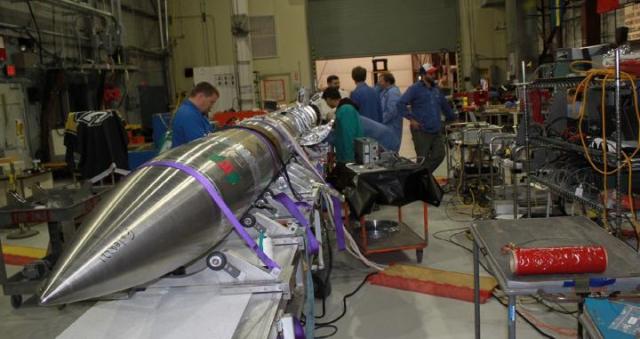Dec 7 2015
The blackness of space. There isn't much visible light in space - but there are numerous other wavelengths of light and scientists want to know what's out there and where it comes from.
 The DXL-2 payload is prepared for launch in the NASA payload assembly building at the White Sand Missile Range in New Mexico. Credit: NASA/Ted Gacek
The DXL-2 payload is prepared for launch in the NASA payload assembly building at the White Sand Missile Range in New Mexico. Credit: NASA/Ted Gacek
Diffuse x-ray emissions have long been believed to be from remnants of a supernovae which formed the local hot bubble. However, the Diffuse X-rays from the Local Galaxy, or DXL, experiment in 2012 found that around 40 percent of this radiation is a result of the solar wind charge exchange, solar wind taking away electrons from neutral gas in space emitting x-rays.
On Dec. 4, 2015, NASA will launch the DXL-2 payload at 11:45 p.m. EST, from the White Sands Missile Range in New Mexico to continue the study of these x-rays. The launch window runs until 2:45 a.m. EST Dec. 5.
"The purpose of the flight is to better understand the nature and characteristics of the local hot bubble and solar wind charge exchange, with the double goal of understanding their fundamental physics and improving our modeling capability to use in the interpretation of past, present and future X-ray missions," said Massimiliano Galeazzi, the DXL-2 principal investigator from the University of Miami.
The payload incorporates an upgraded University of Wisconsin Aerobee IV instrument flown on several rockets from 1973 through 1980.
The 1,497 pound DXL-2 payload will fly on a NASA Black Brant IX suborbital sounding rocket to an altitude 139 miles. The payload will be recovered and would be available for future flights.
DXL-2 is supported through NASA's Sounding Rocket Program at the Goddard Space Flight Center's Wallops Flight Facility in Virginia. NASA's Heliophysics Division manages the sounding rocket program.